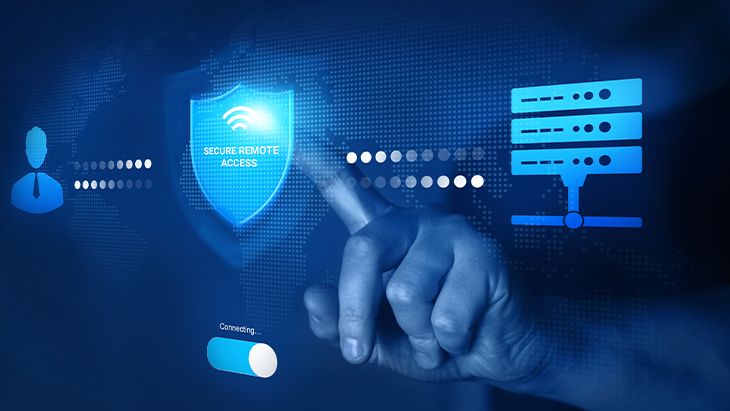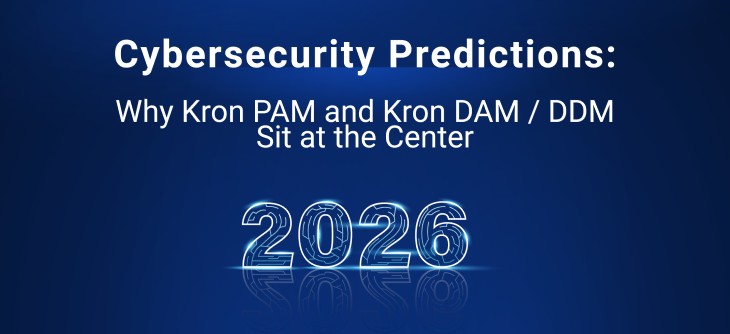
Cybersecurity in the Logistics Industry
May 15, 2022
/
Kron
Today, the digitalization trend, deeply affecting both social and business life, restarts the process for the logistics industry and makes things much easier. With the digitalization of the supply chain, transparency, speed, and cost advantage increase the companies’ interest in technology. The transportation industry now prefers to track the goods it carries and store their customer data in the cloud using IoT. However, cyber attackers continue their work and are looking for a way to take advantage of the vulnerabilities of Information and Communication Technologies. The digital footprint resulting from the data storage in the cloud is a clear target for cyber attacks. Establishing and implementing cybersecurity policies to ensure the continuity of daily workflow and the security of business data has gradually become an increasing need for companies involved in the supply chain.
Cyber Attacks Against Logistics Sector Draw Attention
The logistics industry, which is experiencing its golden age with the COVID-19 epidemic, is a potential target for cyber attacks, like any industry that benefits from cloud storage. Researchers of Intel 471, one of the leading intelligence providers on cybercrime, emphasize that the possible cybersecurity crisis in the supply chain will have a negative impact on the global consumer economy, and state that they have identified various network access brokers selling credentials they claim to belong to logistics companies. Cybercriminals claim to have obtained the credentials from vulnerabilities in remote access solutions.
Moreover, cyber attackers threaten the world's leading companies. For example, Expeditors, known as one of the logistics giants in the world, has been trying to cope with a profoundly serious cyber attack since February 2022. The Seattle-based company officially acknowledged the attack but did not confirm whether it was a ransomware event. The company states that the cyberattack has significantly affected some of its operating systems and its operations continue to slow worldwide. The logistics company, which generated $10.1 billion in revenue last year alone, says it shut down most operating systems globally after noticing the cyberattack.
Another example of cyberattacks in the logistics industry was announced by the Swiss airport management service Swissport, last month. The company claims that the BlackCat ransomware group carried out the ransomware attack that affected their IT systems. Cyber attacks were announced by multiple ports in Belgium and the Netherlands, and are just a few of the reported attacks in the logistics industry. Cyber attacks can be prevented by analyzing past reported events in the logistics sector, detecting security vulnerabilities, and taking the necessary security precautions.
Operational and Security Challenges in Logistics
Possible security vulnerabilities in the IT infrastructure of the logistics sector can lead to irreparable damage, such as the loss of data in the system and even theft and misuse. Cyber attacks, which can have serious consequences, from material damage to negative impact in the brand’s image, may even cause the institution to be fined. The operational and security difficulties in logistics can be summarized under several headings. These challenges firstly cause increased operational costs.
If data breaches and ransomware attacks cannot be prevented, the supply chain suffers financially. Designing cybersecurity protocols to be implemented prevents threats such as ransomware attacks, and reduces the risk of increase in operational costs.
Another difficulty in security is considered to be the increased risk of operational interruptions. Recognizing security vulnerabilities and concentrating on privileged task automation is essential for the continuity of the operation and to prevent the potential dangers of unauthorized access to the supply chain. Experts reveal that the majority of the security vulnerabilities are caused by general purpose computers used in the organization and connecting to internal networks from outside. The Privileged Access Management (PAM) approach against such dangers is one of the leading measures to be taken against operational interruptions caused by cyber attacks in the logistics sector.
Organizations in the logistics industry agree that critical infrastructure protection is directly related to the security of systems that are directly involved in the supply chain processes. People working in the critical infrastructure sector are required to comply with regulations that demonstrate they meet cybersecurity standards. Having the sector operate in accordance with the relevant standards and regulations is one of the operational and security challenges. In terms of access and data security, methods such as privileged account login management, central password management, two-factor authentication, or data masking, ensure that organizations comply with the necessary standards and regulations.
Security Vulnerabilities Encountered in the Logistics Industry
With the development in the logistics sector, the number of users and applications accessing the data included in the procurement process from within the organization and remotely has also increased. There is access to cloud data by many privileged and administrative accounts, from support personnel to maintenance personnel, from remote vendors to corporate and collective applications, in order for operations to be maintained effectively and efficiently. The increasing number of privileged accounts makes them difficult to manage and their control systems are an open target for cyber attackers.
One of the security vulnerabilities in the industry is the use of applications with hard-coded credentials. The incorporation of commercial off-the-shelf (COTS) equipment into the logistics industry along with IoT can lead to an increase in the number of users with hard-coded credentials, thus leading to remote malicious use of the system.
Another vulnerability is the use of shared accounts. It is foreseen that the logistics sector will mostly work with the help of COTS / IoT technology in the future and the use of shared accounts will become widespread. The increase in the number of shared accounts and the number of privileges assigned to these accounts also makes it difficult to track the movements of the parties involved in the operation chain.
Finally, the invisibility of users with remote access is critical among the security vulnerabilities in the logistics industry. The development of the technology used in the operations of the logistics industry makes it easier for industry employees to work remotely. Remote processes are often sessions that occur over an unsecured remote connection, sometimes for days, sometimes for weeks, depending on the duration of the shipment, and can leave the system vulnerable to ransomware attacks.
Cybersecurity Tips for the Logistics and Transportation Industry
In order to provide cybersecurity in the logistics sector, the existence of cyber threats must first be accepted. Challenges may arise from the interaction with external partners over uncontrolled networks during the shipping process. Applications such as secure remote access and network segmentation help tackle those challenges. Some of the measures that can be taken to ensure data security and protect the company against cyber attacks include training company employees to be aware of cyber threats, using multi-factor authentication and strong passwords, keeping software up-to-date to prevent security vulnerabilities, investing in cybersecurity applications, and frequently back up files on the cloud to protect them from ransomware.
Ensuring privileged account access security and addressing the most common cyber security vulnerabilities in the logistics industry also plays an important role in preventing data breaches. The most effective way to secure authorized accounts on-premises or in the cloud is through Privileged Access Management (PAM) solutions. Our PAM solution, Single Connect, reduces the risk of cyber attacks by monitoring privileged account sessions with its Privileged Session Manager module.
IoT devices also have an important role in the digital transformation of the logistics industry. Other Single Connect modules, such as the Database Access Manager and Privilege Task Automation, can record database access by privileged accounts connected to IoT devices, as well as automate routine operations. The Dynamic Password Controller and Two-Factor Authentication acts as protection layers within Single Connect and ensure the secure management of identity and password information, protecting the credentials of privileged accounts with randomized passwords and additional authentication steps. These features prevent these privileged accounts from becoming internal or external threats.
Today, when cyber attacks are more devastating than ever before, it becomes inevitable for the logistics sector to implement cybersecurity measures . You too can benefit from a PAM product that includes components such as Privileged Session Manager, Dynamic Password Controller, Database Access Manager, Privileged Task Automation, Data Masking, and Two-Factor Authentication, to protect all the components in your supply chain against any possible cyber threat. You can protect your critical data with end-to-end data and access security solutions like Single Connect.
Feel free to contact us for more information about Single Connect!




















